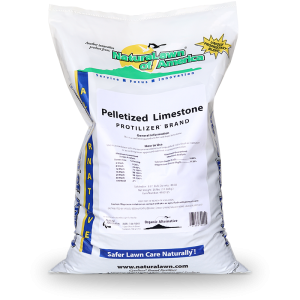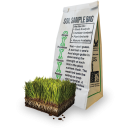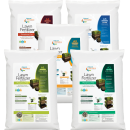Pelletized Lime with Protilizer

Treat your acidic lawn with what it needs.
Pairs Well With
Balance soil pH with pelletized lime for lawns
Up to 70% of lawn fertilizer is wasted when soil pH is too acidic, leading to inefficient growth. To raise the pH of acidic lawns, Natural Alternative® offers Pelletized Lime Enriched with Protilizer®. Exclusive to Natural Alternative®, our fast-acting lime improves lawn health by releasing essential trapped nutrients in the soil.
Supercharged pelletized lime for lawns
Pelletized lime for lawns is blended with Protilizer® Seed & Plant Activator, an organic plant supplement rich with beneficial microbes that fight off disease and turf damage. Protilizer® helps grass roots grow strong for optimal water absorption, providing visibly healthier results as you raise the pH of your lawn’s soil.
Product Information
Application Instructions
Refer to your soil test results for recommendations regarding pounds per 1,000 square feet, frequency of lime fertilizer application and the timing.
Frequently Asked Questions
Pelletized lime is a soil amendment that is made from finely ground limestone. The limestone is compacted into small, easy-to-spread pellets, making it more manageable and less messy to apply than traditional powdered lime.
Pelletized lime is used to correct acidic soil conditions. Most grasses prefer a slightly acidic to neutral soil pH, in the range of 6.0 to 7.0. If the soil becomes too acidic, it can prevent the grass from absorbing essential nutrients. Pelletized lime raises the pH of the soil, reducing its acidity and making it more conducive for grass growth.
Start by conducting a soil test to measure your lawn’s pH. If it's too acidic, calculate how much lime you need based on your soil test results and the guidelines provided on the pelletized lime packaging. Apply the lime using a multi-purpose seed spreader and ensure it's spread evenly across your lawn. Water the lawn after application to help the lime absorb into the soil.
Pelletized lime works slowly. It can take several months or even up to a year to fully adjust your soil's pH.
Yes, applying too much lime at once can create overly alkaline conditions, which can be harmful to your lawn. If you need to make a large pH adjustment, it's usually best to do it gradually over a period of several years.
Write a Review
Get Dirty!
Sign up for our monthly newsletter, The Monthly Dirt, for timely lawn and garden tips, checklists and product recommendations.



